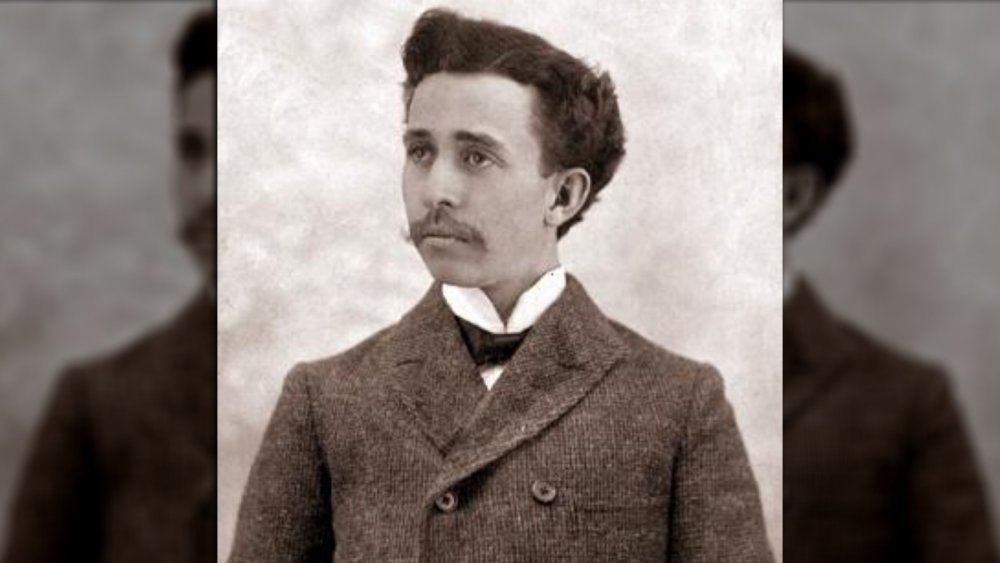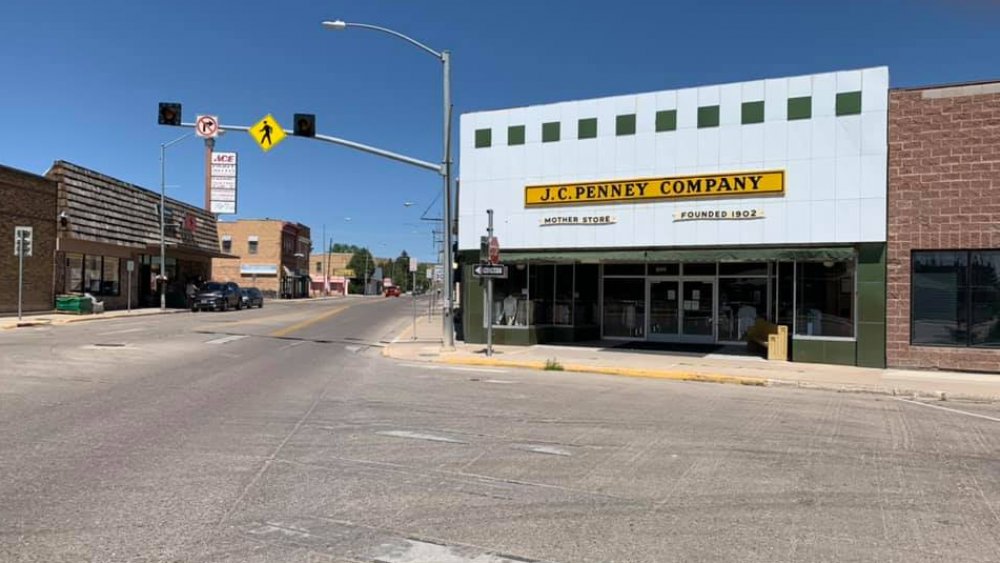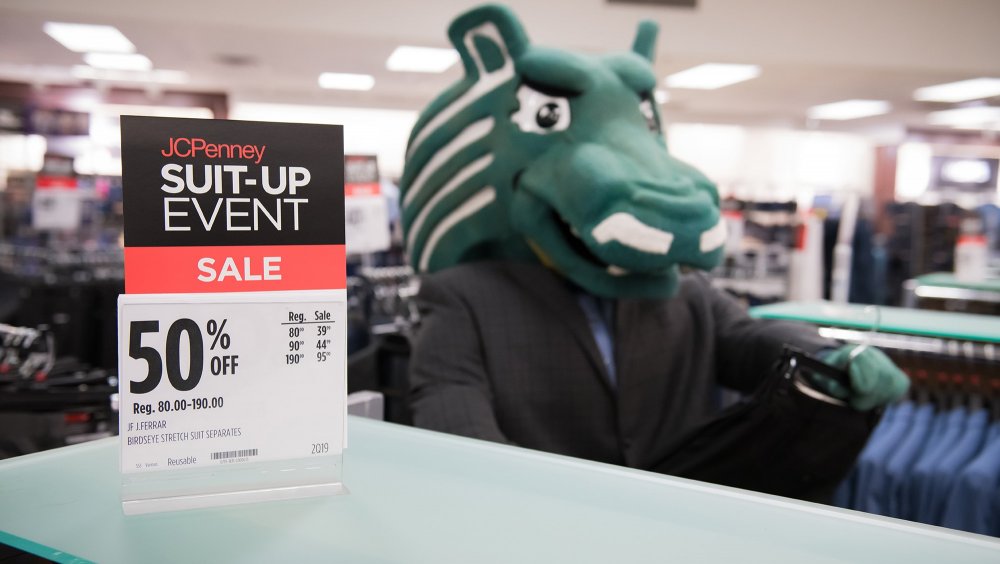The Untold Truth Of JC Penney
The long and storied history of JC Penney began in 1902, but over the past few years, it seems like all the news out of the entire retail industry has been bad. From industry-wide store closures to JC Penny's own filing bankruptcy filing, it was beginning to seem as if this legendary department store might not be around to celebrate its 120th anniversary.
Still, as history shows again and again, companies do have a way of bouncing back, and Penney's, at it is colloquially known, has overcome adversity before. The chain survived a few world wars, not to mention The Great Depression, not to mention an extremely "inauspicious" introduction to the New York Stock Exchange, according to Business Insider. Then known as J.C. Penney, the company went public just one week before the stock market crash of 1929. Talk about bad timing! And yet, it weathered the storm and came back stronger than ever. So yes, the retailer may be down as of this writing, but it may not be tapping out quite yet.
JC Penney's founder had a very appropriate name
Have you ever run across someone whose name was just perfect for them? Perhaps an undertaker named Mr. Coffin, or an environmental activist named Ms. Green? Names that seem to suit a person's character or occupation are known as "aptonyms" (via The Free Dictionary), and you're probably familiar with a few famous ones: sprinter Usain Bolt and poet William Wordsworth come to mind.
Well, add one more to that list: James Cash Penney. With a name like that, could the man who put the J.C. into Penney's go into any field other than retail? Banking, possibly. But retail it was, and those "Penneys" sure added up to a whole lot of "Cash" –- by 1951, the chain had made its first billion (via Business Insider). Not impressed yet? Well, the US Inflation Calculator tells us that a billion dollars back then would be worth nearly 10 billion today.
Penney's has its own historic district
Mr. James Cash Penney may have begun his career as a failed Missouri butcher (via Business Insider), but when he moved to Wyoming to start a store he called The Golden Rule, he met with such success that he became a household name — at least, from 1914 onwards, when the store chain he began was renamed in his honor.
JC Penny, the store, secured its place in history over the next century, and so did Penney, the man. So much so that the two of them share their own historic district, According to the National Register of Historic Places, the J.C. Penney Historic District, established in Kemmerer, Wyo. is made up of the original retail store, James Penney's former home, and several other commercial structures dating from the time the Golden Rule was first established. Taken all together, these buildings are seen as historically significant because they "show the humble origins of the J. C. Penney Company" as well as the place where the store's founder "formulated the merchandising ideas which enabled him to create the first truly nationwide department store chain."
JC Penney actually helped birth its biggest competitor
In the autobiography of another retail titan, we find an interesting anecdote from JC Penney's distant past. Once upon a time, in pre-WWII America, a recent college graduate went to work for the JC Penney store in Des Moines, Iowa. As a 20-something management trainee, he was paid a salary of $75 per month, which was not too bad a wage in 1940 for a young man who was just starting out. His career path at Penney's ran into a dead end 18 months later, as World War II had war broken out, and he patriotically resigned to enlist in the military, although he remained "stateside because of a heart condition."
Still, he'd obviously learned a thing or two about running a department store from the time he spent working for that establishment, not to mention the valuable lesson he learned from actually meeting James Cash Penney himself during a fateful store visit: "I still remember him showing me how to tie and package merchandise, how to wrap it with very little twine and very little paper but still make it look nice." The young man's name? Sam Walton. And his store, of course, was to become the world's largest retailer, Walmart.
JC Penny adopted some shady sales practices
While The Motley Fool tells us that JC Penney's peak of success occurred in the 80s and 90s, by the time the 21st century came around, the retailer started to slip a bit. (Thanks in no small part to Walton, undoubtedly their most successful ex-employee ever.) By the 20-teens, the department store allegedly resorted to staging fake "sales" that were really more like scams.
Former Penney's workers told Today that whenever the store would decide to have a sale, it would raise the price of each item before it was "discounted." As one Virginia employee revealed, "All of a sudden, the rack of $7 shorts became $14, and then they were 50 percent off." Another employee in Florida told Today that price doubling wasn't the worst of it. He claimed prices throughout the store would be doubled, "then [those items] would go on sale, and they wouldn't always go on sale for 50 percent off." He added, "Not only was it a fake sale, but they were actually paying more than they would have been previously."
This alleged practice is pretty ironic, given that the store's original name, Golden Rule, was meant to refer to the axiom about treating others as you would be treated, according to Business Insider. If the entire retail industry wasn't experiencing a fundamental shift in its business model, one could make the argument that perhaps JC Penny's subsequent troubles were just bad karma manifesting itself. Regardless, let's hope JC Penney learned to start doing right by what few shoppers they have left, since they'll need all the good karma they can come by to get through this bankruptcy thing.
What will new ownership mean for JC Penney?
While JC Penney's bankruptcy proceedings are still ongoing, the retailer did reach an agreement with two mall operators (Simon and Brookfield) who'll be taking over ownership of the company's "retail and operating assets." This does not mean that Penney's will be going out of business, however, as the new owners plan to keep operating under the Penney's name. As store chain chief executive officer Jill Soltau puts it, even under new ownership Penney's plans to continue to "build on [its] over 100-year history." She goes on to say that the chain's "focus will remain on serving [its] customers," adding that it "expect[s] to continue...for decades to come under the JC Penney banner." William K. Snyder, a partner in turnaround management firm CR3 Partners, seems to agree. He told The Dallas Morning News (via Spaeth Communications) that Penney's is not "hopelessly insolvent" and that the embattled chain "has the value and resources to reorganize and successfully emerge [from bankruptcy]."
While store closures affecting 13 states are still in the works for JC Penney, CoStar reveals that the company is now talking of scaling back on some of the previously-planned closures. What's more, Penney's also filed a motion in bankruptcy court to speed up its debt restructuring (via PrimeClerk), with the idea that it could pull itself out of Chapter 11 before the holiday season. That move, paired with store closure announcements from Gap, Nordstrom, and even Walmart, could signal an opening for a leaner JC Penny to recapture some of the retail space abandoned by its rivals. It could possibly be a fairly merry Christmas for JC Penney, after all.





